|
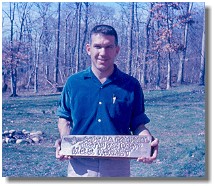
Trophy Carvings
By Hersch Pahl
On 30 July ‘45 my division gave air coverage for a rescue submarine off the coast of Japan for about
3 hours and then after being relieved, we were directed to investigate a nearby enemy harbor where anti-submarine
activity was suspected. We located a small ASW gun boat and proceeded to strafe it and then located a cache of
fuel barrels stored in a canyon ravine nearby. We strafed the cache of fuel barrels repeatedly, setting fire to
the complete store of fuel and then went back to harass the gun boat again.
This was the wrong thing to do, as my Hellcat received numerous hits from exploding shells from the
gun-boat. My plane was difficult to control; however, after slowing it down, it continued to fly and hold altitude.
We received permission to proceed directly back to the our carrier,(Hancock) straight through the air-patrolled air space where we normally
did not fly . The patrolling British
Spitfire fighter planes gave us a bad time
as they made menacing runs on us as we came through the “no-mans-land”. They seemed to be slow getting the word
that we had been cleared for our emergency passage through the area.
After I landed back aboard HANCOCK, and while I was still in the cockpit, the word was passed saying
that my plane was not considered repairable so the maintenance and structures people would only had a few minutes
to salvage instruments or other parts before it would be pushed over the side. This appeared like a good time for
me to abscond with a real good Waltham navigation clock for my own personal souvenir. Using the tools of a man
who climbed up on my plane to salvage instruments, I removed the coveted navigation clock and stashed it in the
pocket of my flight suit and headed off for a debriefing. After it was too late, I caught the wrath of Chief Buzzy
Baur, who explained that he had sent that
guy out to get that clock so that they would a have a spare clock right there at flight deck level ready to use
in case they needed to replace a faulty one of a plane about ready to be launched. Of course I ask for forgiveness,
because my long time friend, “Buzzy” Baur was right and was not one to mess with.
Sometime later I found a piece of oak and then designed and carved an appropriate mounting for the
clock. I had been carrying a small 6-blade set of carving tools around to satisfy my hobby, but now they really
came in handy. When the job was finished I remembered back when I did some carving in a shop class at the University
of Nebraska. I was sure that my teacher, Professor Art Easton would surely be proud of what he taught me.
Navigational Clock and Carving by
Hersch Pahl
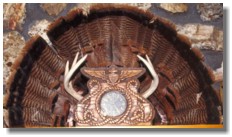 |
|
|
Navigational Clock Carving (Close-up)
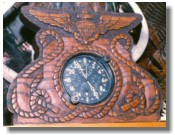 |
|
|
|
|

Teak Wood Deck Plank Carving from USS
HORNET(CV-12)
Early in 1956 the USS Hornet was put in dry dock in Bremerton Washington to receive the “27 Charley”
conversion, i.e., removal of the straight wooden flight deck and for the installation of the new angled (steel)
deck, the new steam catapults, hurricane bough, and many other things. The ship was not decommissioned like they
did other ships like the Coral Sea , so a skeleton crew remained aboard. This skeleton crew included Captain Campbell,
and myself, Hersch Pahl, as the assistant Air Boss.
One of the first things to happen was the removal of the old laminated Teak and fur planking from
the flight deck.
I had a love for the teak wood planking so managed to salvage some good usable pieces and took them
over to the Base hobby shop and planed them down to pieces that I thought I might use. These teak wood planks were
especially beautiful. The wood is tough and does not splinter so it is easy or even fun to carve. I selected one
piece which appeared to be about right to make a trophy from. Thinking ahead to the scheduled retirement of our
captain, I decided to carve something which would make a good retirement trophy for him. I of course, decided to
carve his name on it; then a set of Navy wings with the name of the ship followed by the ship's motto, "Best
in the West".
In view of the fact that the Hornet had been operating mostly in the Western Pacific, I elected to
design the lettering with an oriental appearance. It was a fun project and the end product not only looked good,
but it felt good to the touch.
Note: A very acceptable way to inspect or to see and admire a carving is to feel it with your finger
tips.
Hersch Pahl proudly displays the
carved teak wood plank he presented to Capt. N. A. Campbell upon his retirement Fall of 1956
 |
The Carved plank given to Capt N. A. Campbell as he gave up
command of the USS Hornet (CV-12) and retired from the Navy. Fall 1956.
 |
Capt Campbell was very pleased with his retirement present and I was proud to have done the carving
and delivered it to him at his home in Coronado, California.

Hersch's Trophy Teak Wood Coffee Table
Carving
About the same time as I was doing the retirement trophy for Captain Campbell, I selected a set of
four teak wood planks, (that I had salvaged) and glued them together to make a single slab 20" X 3 ½'
. The round wooden pegs that were used in the flight deck construction, were left quite visible to add authenticity
to the end product. The slab seemed just right to make a coffee table and of course a perfect place to carve an
appropriate design to commemorate the USS Hornet CV-12 as she was before she underwent her “27 Charley” conversion.
I chose to carve a huge set of Navy Pilots "Wings of Gold" as the main item in the design
and then placed the ships name below and the ships motto above like a crown or halo. I again chose to design the
lettering with an oriental flavor as I had done with Captain Campbell’s retirement trophy.
After the ship’s conversion project was completed and she went back to sea, the unfinished carving
project went with me.
The next deployment to the western Pacific was a busy one and the carving project had to wait until
my next duty assignment.
Even before the carving was completed, the trophy was given a set of four legs and it was pressed
into service as the family coffee table. The carving job continued as an on-going project for over a year until
the job was done.
The Carved Teak Wood Coffee Table with legs
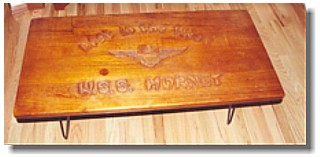 |
In our present retirement home...
...the table's legs have been removed and the table top
itself has been mounted (bolted) to a wall of our home in a place of honor...
The Carved Teak Wood planks from the Flight Deck of USS Hornet
(CV-12) were laminated and made into a Coffee Table by Hersch Pahl
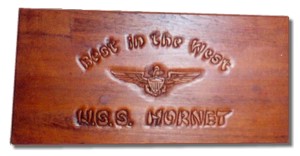 |
Behind the scenes there is some lobbying going on between my two sons and the old USS Hornet museum
at Alameda, CA to determine where it will go after I take “that final cut”.

Memorial Carving to VF-6 Skippers and
"Felix the Cat"
In 1959, as a staff officer from Defense Atomic support Agency (DASA), I was a member of a joint
working group assigned to phase down and decommission the Atomic Testing Facility at Eniwetoc Atoll in the Marshall
Islands. On the return trip from a visit to that atomic testing facility I chanced to purchase a big slab of tropical
hard wood, from a ”Golden Shower” tree. I was impressed with the hardness and the beautiful grain of the wood.
It wasn’t easy but I managed to get the heavy plank aboard our plane, (a Special Air Mission) or SAM flight. The
General in charge was convinced that some one was going to make him a retirement trophy.
|
VF-6 Squadron Memorial Trophy Carving of VF-6 Skippers and
"Felix the Cat" by Hersch Pahl
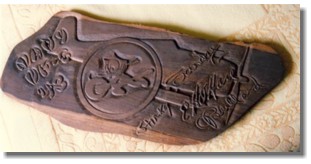 |
|
The complete design of this carving was sort’a like Topsy - "it just grew" - usually in
any wood carving, the first thing to be carved is the fore front and the last thing to be carved is the background.
Following that procedure, I first carved the big image of Felix the Cat (VF-6 insignia). After it was done and
felt good to the touch, I carved the words “Navy VF-6 43" in a prominent place.
To make it more of a squadron trophy, I decided to display
an enlargement of the signatures of our most prominent leaders, Butch O’Hare, George Bullard, “Sandy” Crews and”
Stinky” Harrison. When that was done it seemed most appropriate to carve for the background a huge image of a diving
Hellcat. After that was completed and the whole piece was feeling about right to the touch I carefully made a concave
groove around the outer edge of the plank so that it would hold securely a portion of a 2" manila line or
rope. (Note: the rope came from the old hay-mow rope in the old hay barn of our retirement farm.) This rope border
or frame gave it a nautical appearance.
Last but not least I signed it with a carving tool.
Close-up of same to show Signature
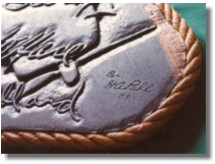 |
Note: One thing unusual about this plank was it’s hardness. It was too hard to do the job with carving
tools so I had to resort to the use of small electrical powered grinding tools.

A "Farewell
Carving" - My Staff and friends say Good-bye
My Farewell Present
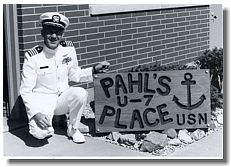 |
This trophy was designed and produced by Lt Robert Bruce, a staff member of the University Nebraska
ROTC in spring 1973. It was to be a farewell present for his Commanding Officer. To make something useful, Bob
and his wife visited the U-7 farm where Herschel and Bonnie Pahl intended to retire one day and to peruse a new
goal of tree farming, raising Cattle, grass and grand children. Later this trophy was mounted on cedar pole to
tell all folks round-about that their new neighbor was proud to be the owners of Pahl's U-7 Farm, four miles east
of Ava, MO on Hunter Creek.
This Trophy Carving is also featured on my Retirement Page
Here.
- Hersch Pahl
"For those who fought for it...
freedom has a flavor the protected will never know!"
|